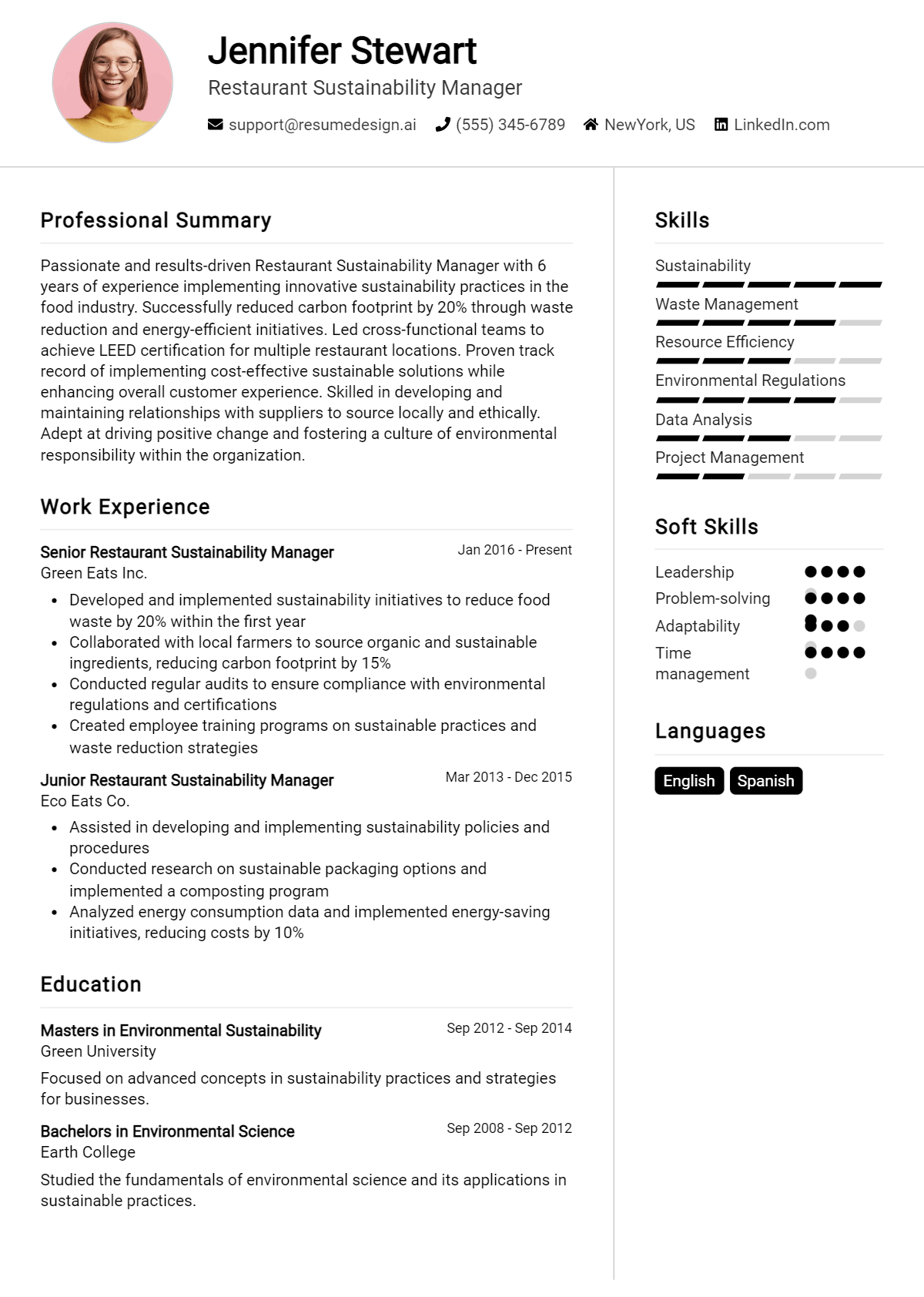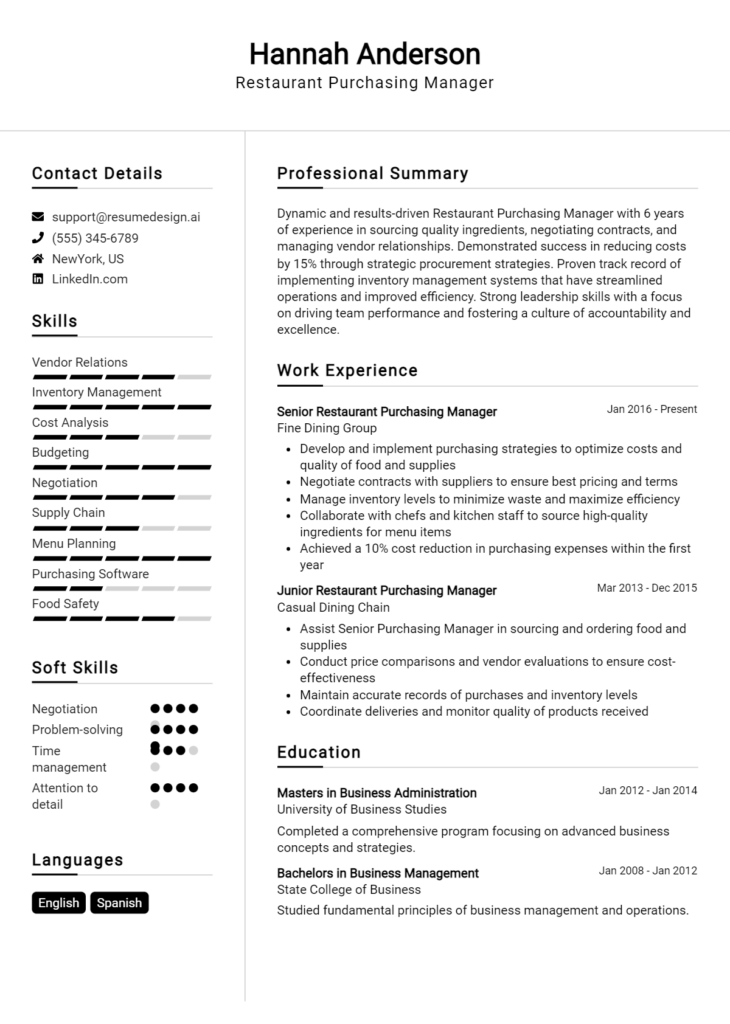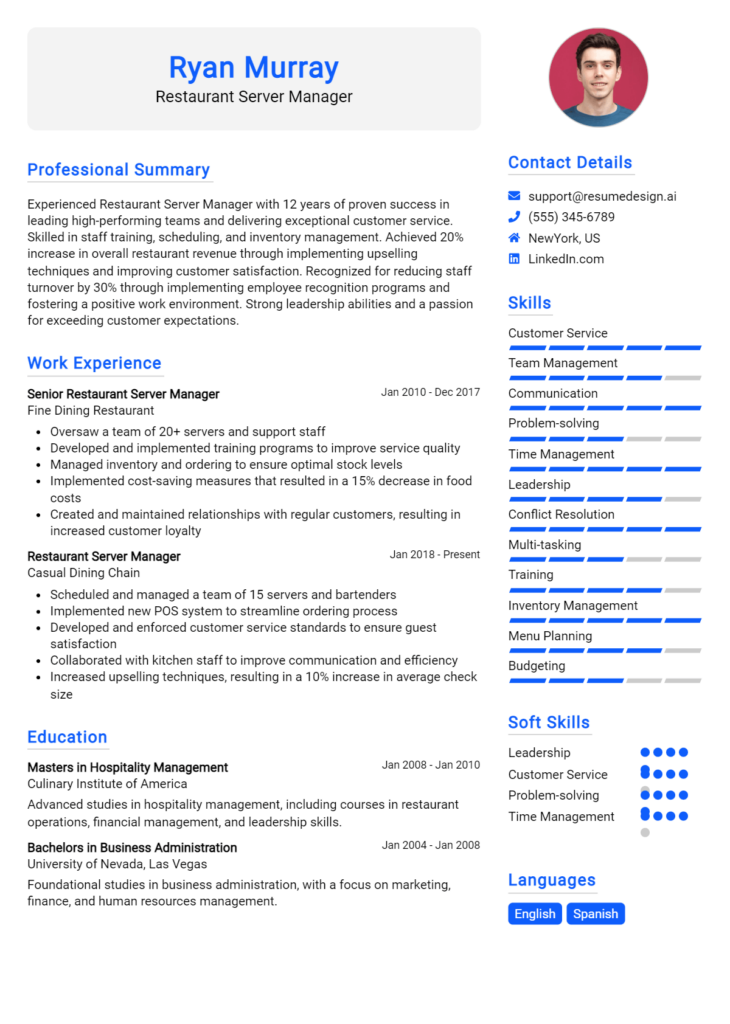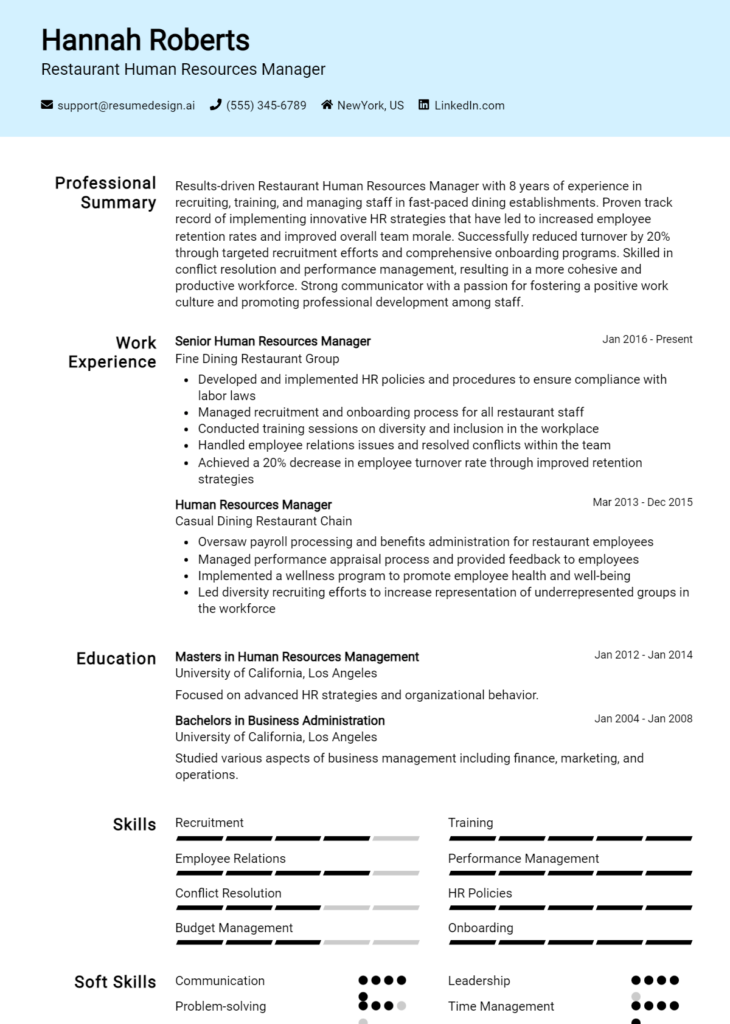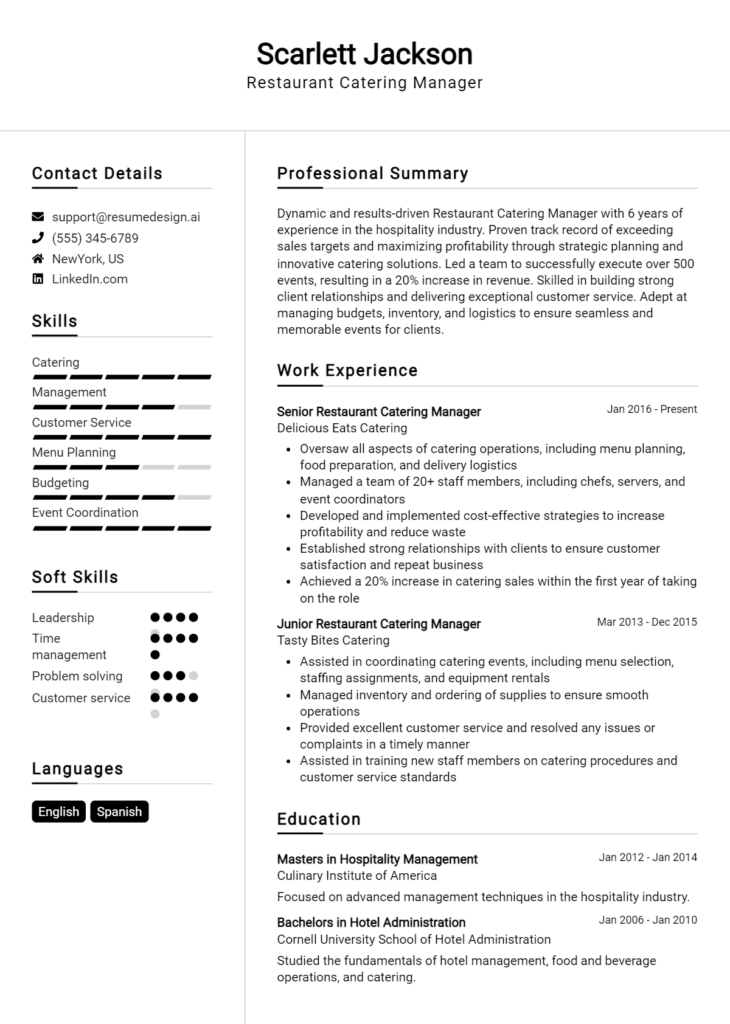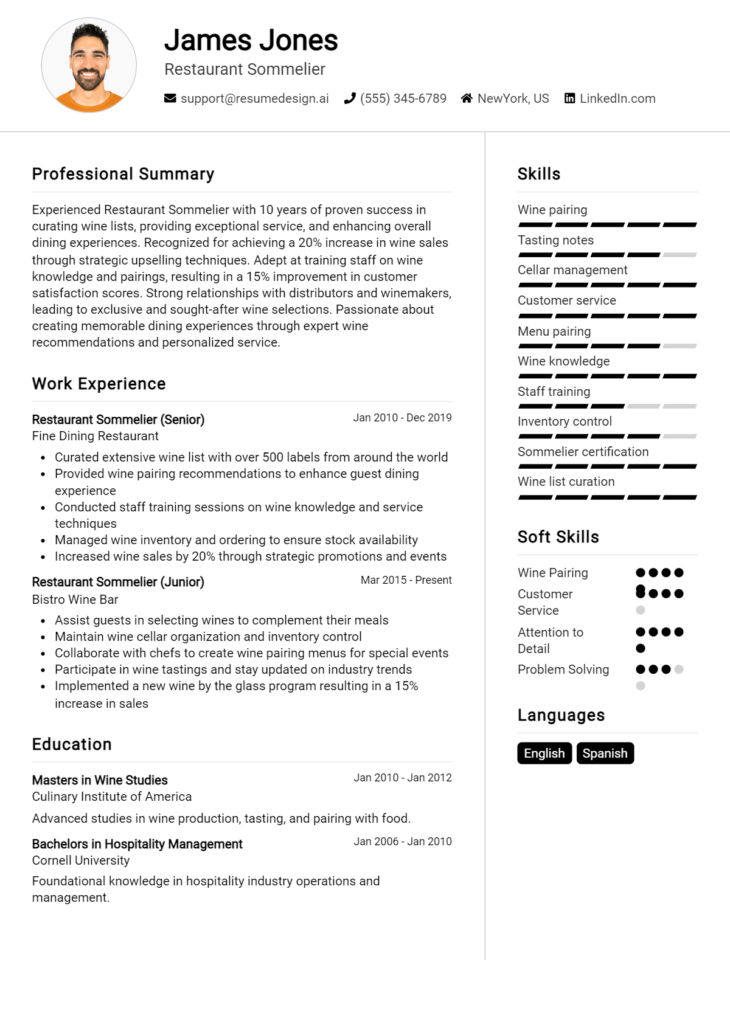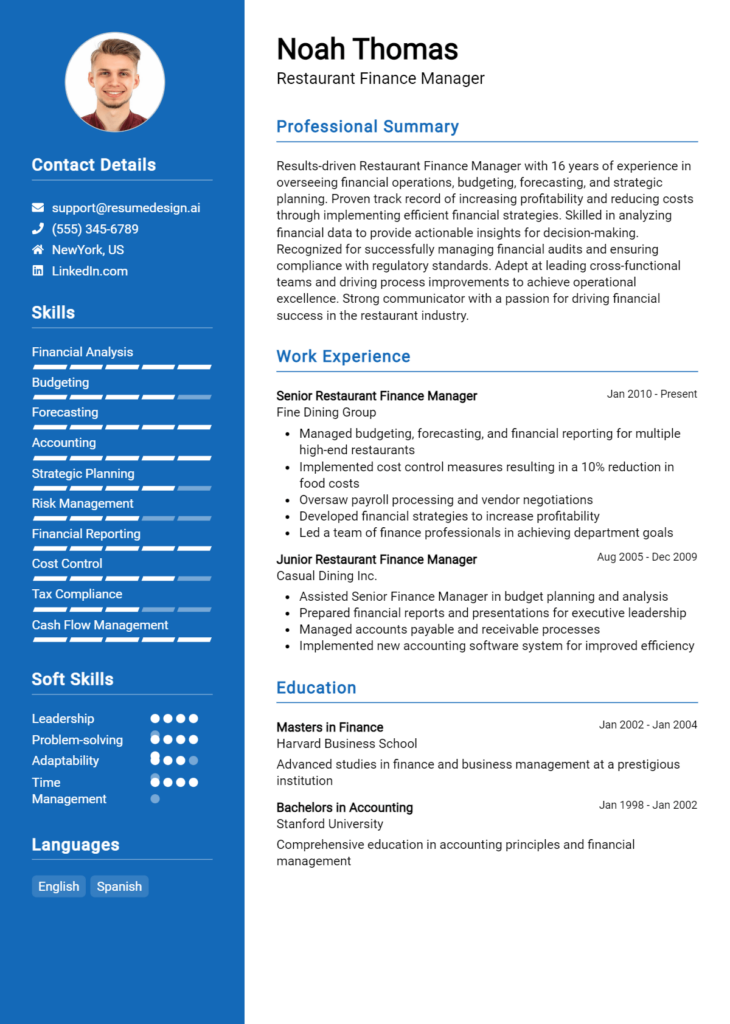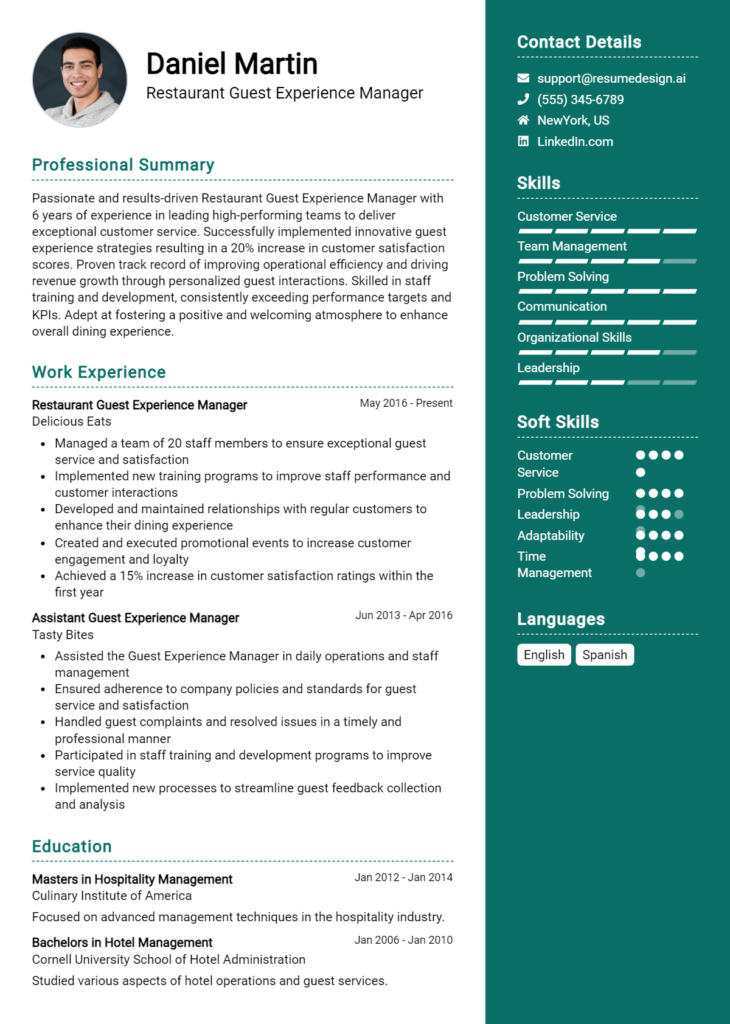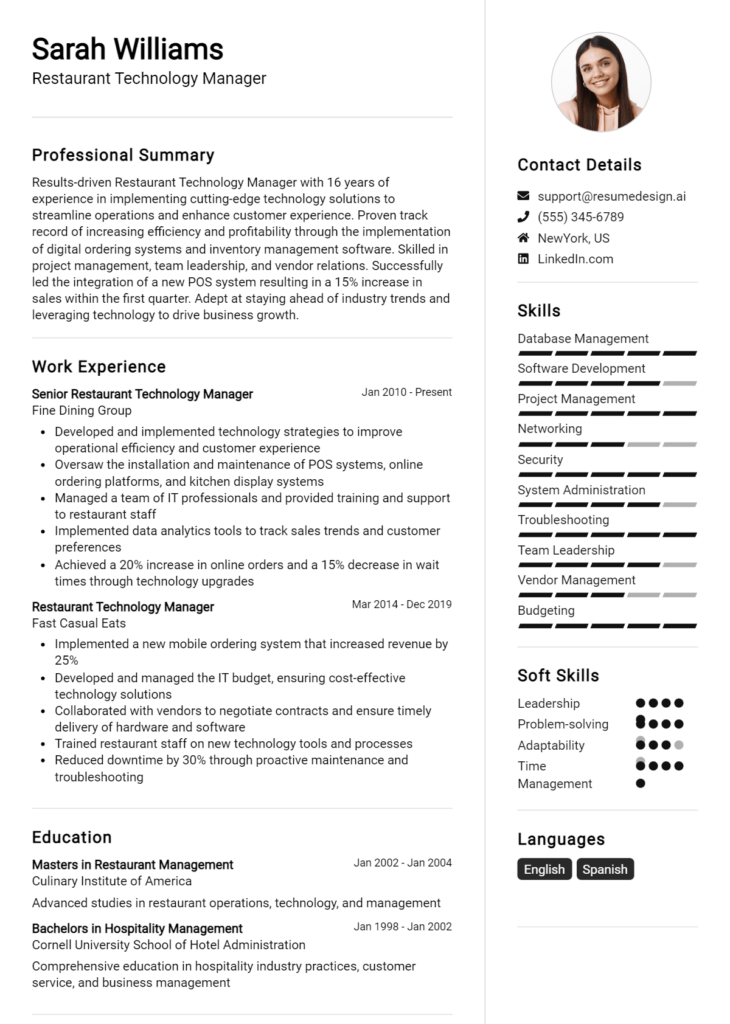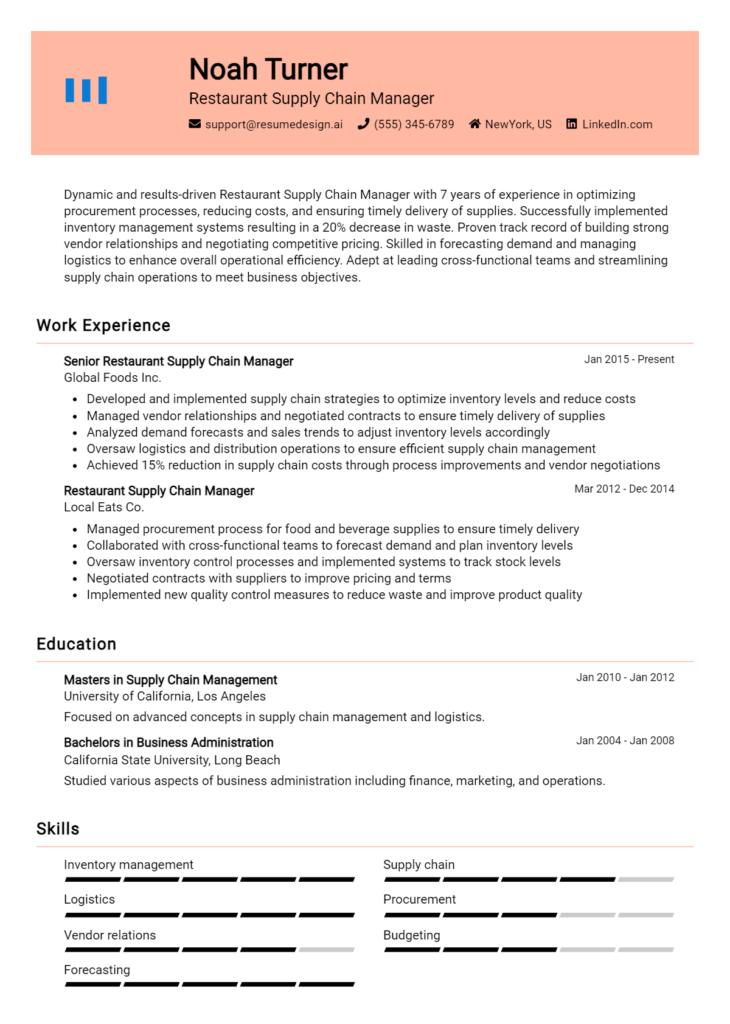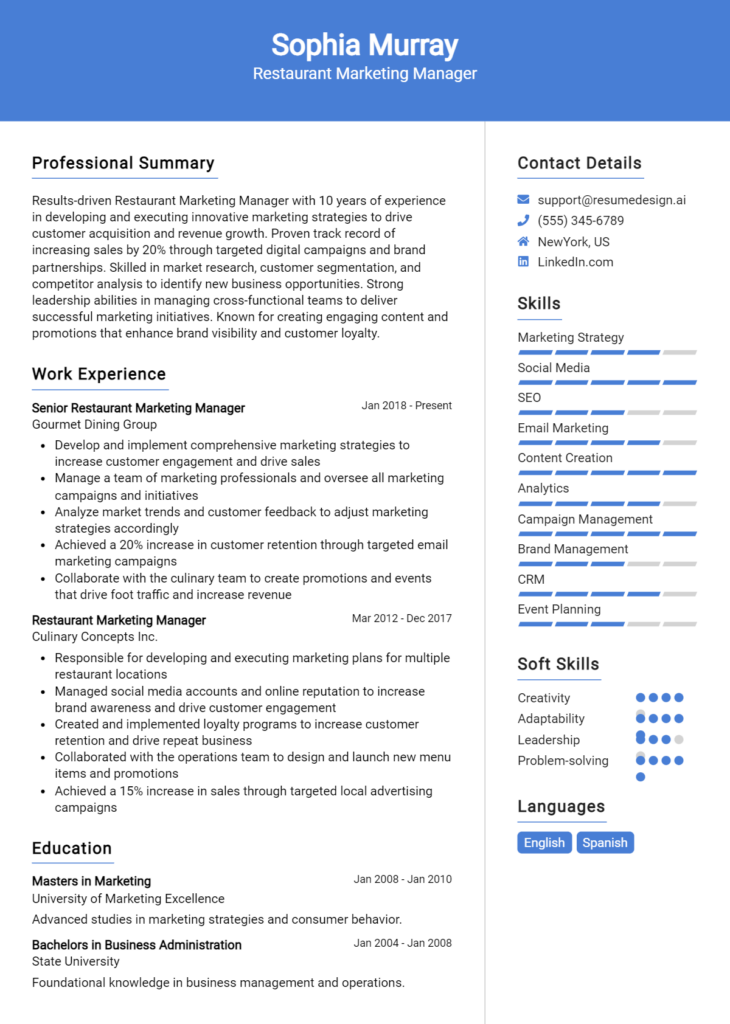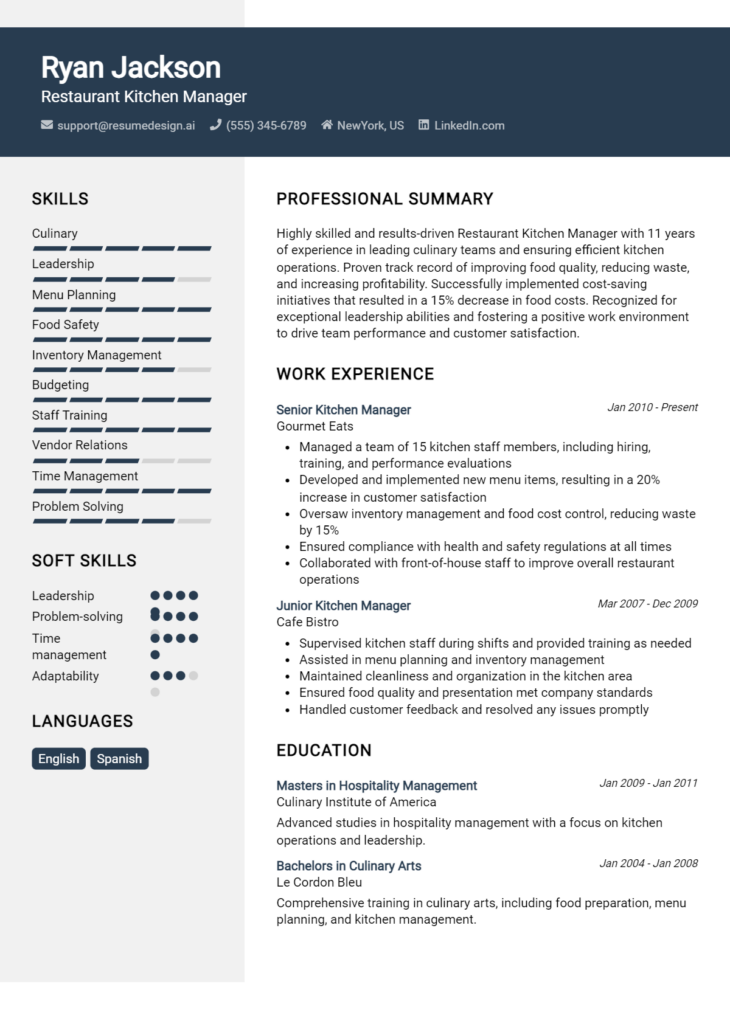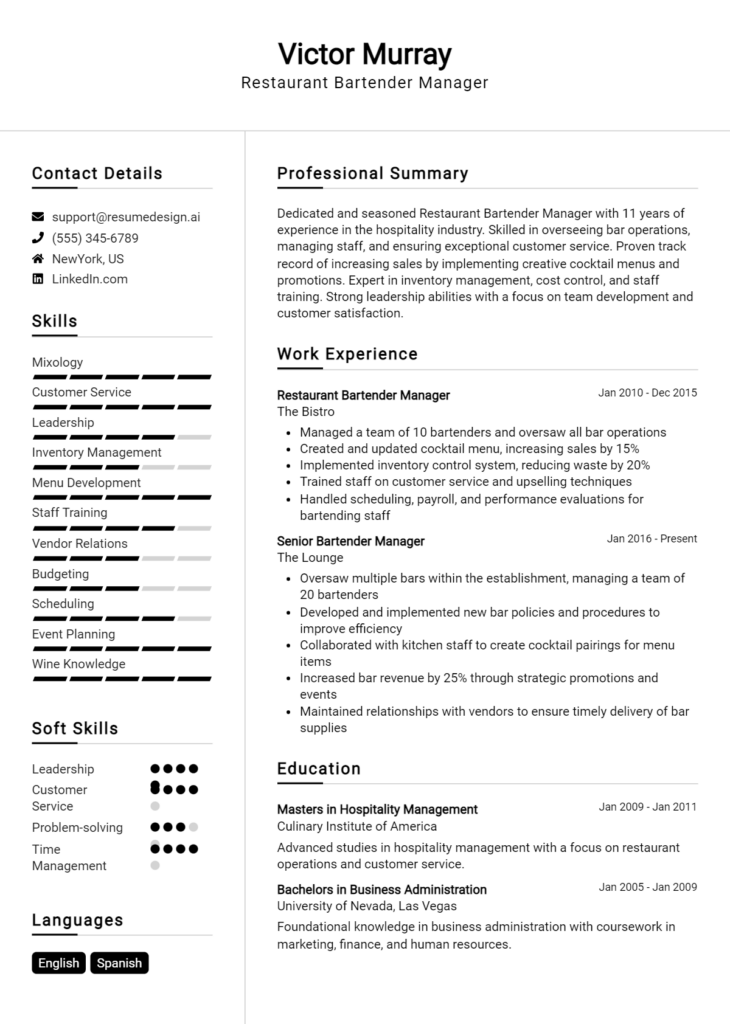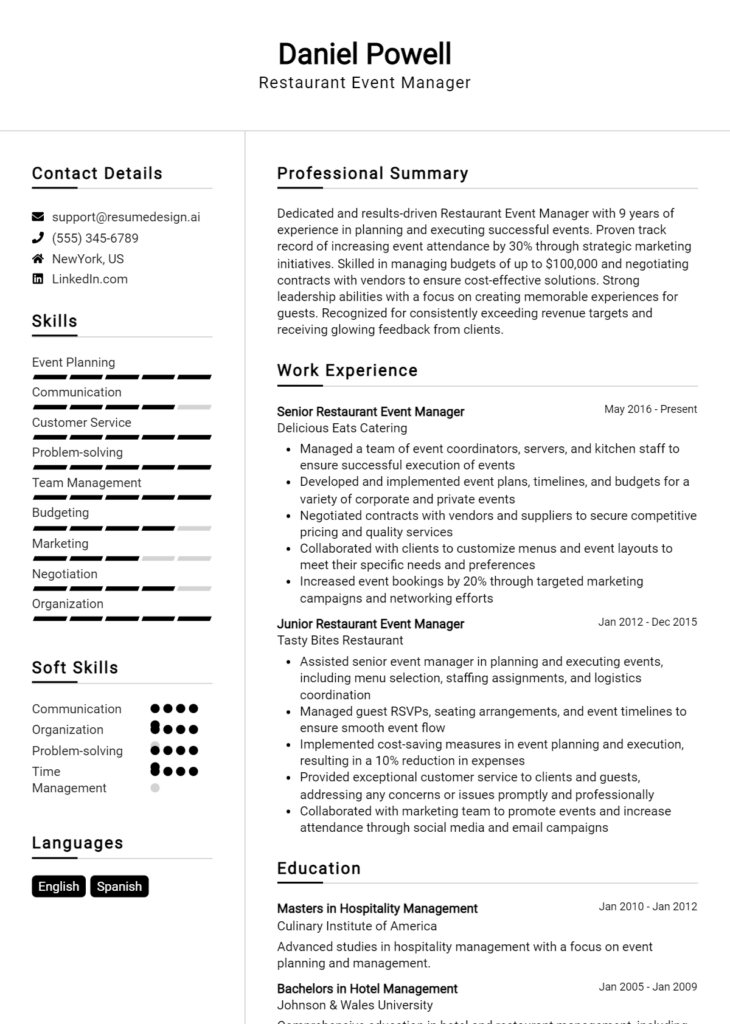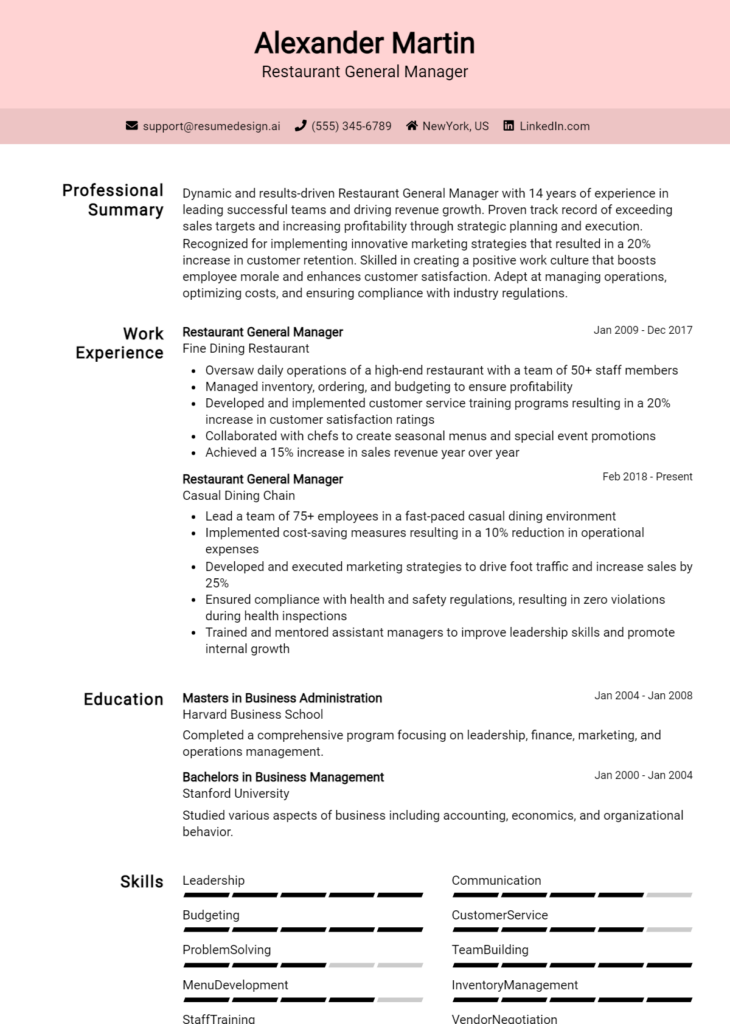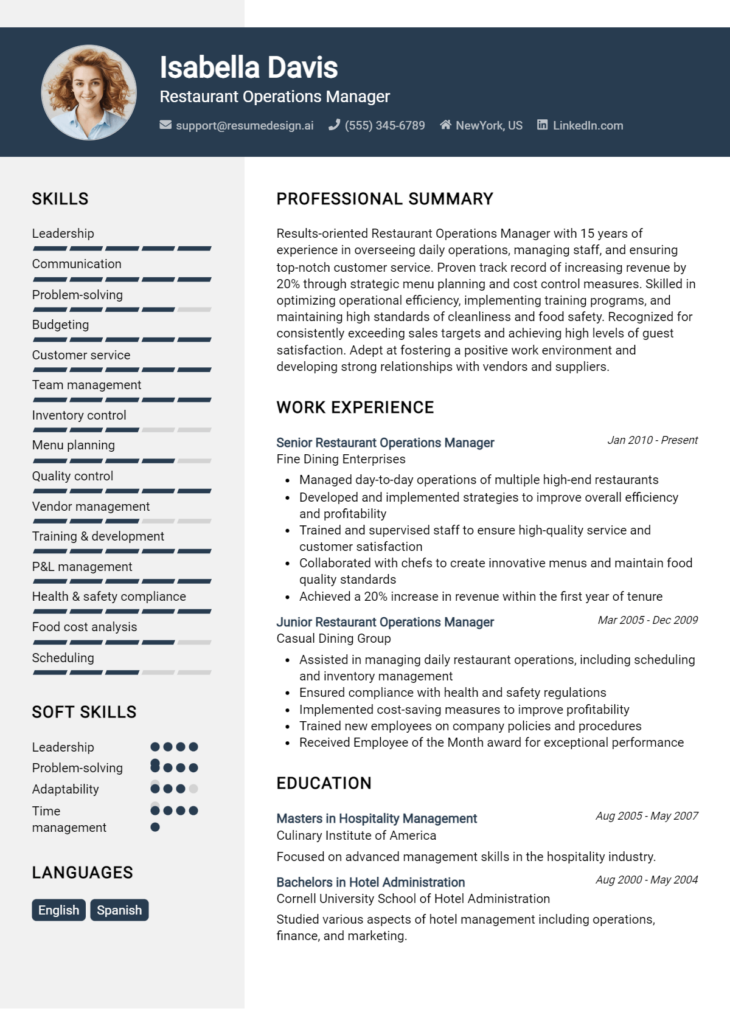Restaurant Sustainability Manager Core Responsibilities
The Restaurant Sustainability Manager plays a pivotal role in integrating sustainable practices across various departments, including operations, procurement, and marketing. Key responsibilities include developing and implementing eco-friendly initiatives, conducting waste audits, and collaborating with suppliers to source sustainable ingredients. Essential skills encompass technical knowledge in sustainability metrics, operational management, and problem-solving abilities to address environmental challenges. These competencies contribute significantly to the organization's sustainability goals, making a well-structured resume crucial for showcasing these qualifications effectively.
Common Responsibilities Listed on Restaurant Sustainability Manager Resume
- Develop and implement sustainability strategies and initiatives.
- Conduct waste audits and monitor waste management practices.
- Collaborate with suppliers to source sustainable and ethical products.
- Oversee energy and water conservation programs.
- Train staff on sustainability practices and initiatives.
- Analyze sustainability metrics and report on progress.
- Engage with community organizations for sustainability partnerships.
- Manage compliance with environmental regulations and standards.
- Coordinate recycling and composting programs.
- Develop marketing campaigns that highlight sustainability efforts.
- Research and stay updated on industry sustainability trends.
High-Level Resume Tips for Restaurant Sustainability Manager Professionals
A well-crafted resume is essential for Restaurant Sustainability Manager professionals, as it serves as the first impression a candidate makes on potential employers. In a competitive job market, where sustainability practices are becoming increasingly important in the restaurant industry, your resume must effectively showcase your skills and achievements. A strong resume not only highlights your relevant experience but also demonstrates your commitment to sustainable practices and your ability to drive change within a restaurant setting. This guide will provide practical and actionable resume tips specifically tailored for Restaurant Sustainability Manager professionals to help you stand out in your job search.
Top Resume Tips for Restaurant Sustainability Manager Professionals
- Tailor your resume to the specific job description, using keywords that align with the responsibilities and requirements of the position.
- Highlight relevant experience in sustainability initiatives, such as waste reduction, energy efficiency, and sourcing local ingredients.
- Quantify your achievements by including metrics, such as percentage reductions in waste or energy consumption, to demonstrate your impact.
- Showcase industry-specific skills, including knowledge of sustainable food sourcing, environmental regulations, and waste management practices.
- Incorporate certifications related to sustainability, such as LEED or Green Restaurant Association certifications, to enhance your qualifications.
- Use action verbs to describe your responsibilities and accomplishments, making your contributions stand out to employers.
- Include a section for professional development, listing workshops, seminars, or courses that demonstrate your commitment to staying current in sustainability practices.
- Keep your resume clean and organized, using clear headings and bullet points to make it easily scannable for hiring managers.
- Consider adding a summary statement at the top of your resume that encapsulates your expertise and passion for sustainability in the restaurant sector.
By implementing these tips, you can significantly increase your chances of landing a job in the Restaurant Sustainability Manager field. A well-structured resume that effectively showcases your skills, experience, and achievements will not only capture the attention of hiring managers but also position you as a strong candidate ready to make a positive impact in the restaurant industry.
Why Resume Headlines & Titles are Important for Restaurant Sustainability Manager
The role of a Restaurant Sustainability Manager is crucial in guiding dining establishments toward environmentally friendly practices, reducing waste, and promoting sustainable sourcing. In the competitive culinary job market, a well-crafted resume headline or title can serve as a powerful first impression. It can instantly capture the attention of hiring managers and succinctly encapsulate a candidate's key qualifications in a single impactful phrase. A strong headline should be concise, relevant, and directly aligned with the responsibilities and skills required for the role, making it an essential element of an effective resume.
Best Practices for Crafting Resume Headlines for Restaurant Sustainability Manager
- Keep it concise: Aim for a headline that is brief yet informative, ideally 8-12 words.
- Be role-specific: Use terms and keywords that are directly related to the position of Restaurant Sustainability Manager.
- Highlight key qualifications: Incorporate your most impressive achievements or skills that set you apart from other candidates.
- Use action words: Start with dynamic verbs that convey a sense of accomplishment and initiative.
- Tailor for each application: Customize your headline to reflect the specific job description and requirements of the role you are applying for.
- Showcase your passion: If possible, include your commitment to sustainability and environmental stewardship in your headline.
- Avoid jargon: While industry-specific terms can be beneficial, make sure they are understandable and relatable to a broad audience.
- Make it memorable: Strive for originality to ensure your headline sticks in the mind of the hiring manager.
Example Resume Headlines for Restaurant Sustainability Manager
Strong Resume Headlines
“Experienced Restaurant Sustainability Manager Driving Zero Waste Initiatives”
“Passionate Eco-Conscious Leader with Proven Record in Sustainable Sourcing”
“Innovative Sustainability Specialist Enhancing Operational Efficiency in Dining”
Weak Resume Headlines
“Manager Looking for Job”
“Sustainability Expert”
The strong headlines are effective because they are specific and highlight the candidate's relevant skills and accomplishments, making them more memorable and impactful. In contrast, the weak headlines lack detail and clarity, failing to convey the candidate's unique qualifications or motivations, which can leave hiring managers unimpressed and uninterested in the applicant's resume.
Writing an Exceptional Restaurant Sustainability Manager Resume Summary
A well-crafted resume summary is crucial for a Restaurant Sustainability Manager, as it serves as the first impression a hiring manager has of a candidate. This brief yet impactful introduction quickly communicates the applicant's key skills, relevant experience, and significant accomplishments, making it essential for capturing attention in a competitive job market. A strong summary should be concise and tailored specifically to the job description, highlighting how the candidate's expertise aligns with the restaurant's sustainability goals and initiatives.
Best Practices for Writing a Restaurant Sustainability Manager Resume Summary
- Quantify achievements: Use numbers and metrics to showcase the impact of your work, such as waste reduction percentages or cost savings.
- Focus on relevant skills: Highlight the skills that are most pertinent to sustainability management, such as project management, compliance knowledge, and stakeholder engagement.
- Tailor the summary: Customize your summary for each job application, incorporating keywords from the job description to demonstrate alignment with the company's needs.
- Be concise: Keep the summary brief—ideally 2-4 sentences—while still conveying essential information.
- Use active language: Employ strong action verbs to create a sense of dynamism and initiative in your summary.
- Showcase industry knowledge: Demonstrate familiarity with industry trends, regulations, and best practices in sustainability within the restaurant sector.
- Highlight leadership experience: Emphasize any leadership roles or initiatives that showcase your ability to influence and drive sustainability efforts.
- Include soft skills: Mention interpersonal skills, such as communication and collaboration, which are vital for working with diverse teams and stakeholders.
Example Restaurant Sustainability Manager Resume Summaries
Strong Resume Summaries
Dynamic Restaurant Sustainability Manager with over 7 years of experience implementing waste reduction initiatives that decreased landfill contributions by 40%, leading to annual savings of $50,000. Proven ability to engage staff and stakeholders through effective training programs and sustainability workshops.
Results-oriented professional with expertise in sustainable sourcing and supply chain management, successfully increasing the use of local and organic ingredients by 30% in a high-volume restaurant over two years. Skilled in developing and executing eco-friendly policies that improved overall operational efficiency.
Innovative sustainability leader with a track record of launching community engagement initiatives that increased brand loyalty and boosted customer participation in sustainability programs by 25%. Certified in LEED and actively working towards Zero Waste certifications.
Weak Resume Summaries
Experienced manager with a focus on sustainability in restaurants. I have worked in various roles and have a general understanding of sustainability practices.
Passionate about the environment and making restaurants better. I have some knowledge of waste management and green initiatives.
The strong resume summaries stand out because they include specific achievements and quantifiable results that demonstrate the candidate's impact and expertise in sustainability. They are tailored to the role, using industry-specific terminology and metrics that convey a clear narrative of success. In contrast, the weak summaries lack detail and do not provide any measurable outcomes or relevant skills, making them less compelling and less likely to engage a hiring manager's interest.
Work Experience Section for Restaurant Sustainability Manager Resume
The work experience section of a Restaurant Sustainability Manager resume is crucial as it provides potential employers with a comprehensive view of the candidate's qualifications and contributions in previous roles. This section highlights not only technical skills related to sustainability practices, waste management, and energy efficiency but also the candidate's ability to manage teams and deliver high-quality, sustainable products. By quantifying achievements, such as reduced waste percentages or cost savings, and aligning experience with industry standards, candidates can effectively demonstrate their value and readiness to enhance operational sustainability in a restaurant setting.
Best Practices for Restaurant Sustainability Manager Work Experience
- Highlight specific technical skills relevant to sustainability, such as LEED certification or knowledge of waste management systems.
- Quantify achievements with concrete numbers to illustrate the impact of sustainability initiatives (e.g., "reduced energy costs by 20%").
- Showcase leadership abilities by detailing experiences in managing sustainability teams or projects.
- Emphasize collaboration with other departments (e.g., kitchen staff, procurement) to implement sustainability practices.
- Align experience with industry standards and best practices to demonstrate familiarity with current trends.
- Include any certifications or training relevant to sustainability management to bolster credibility.
- Use action verbs to convey a proactive approach to challenges faced in previous roles.
- Tailor work experience descriptions to reflect the specific sustainability goals of the restaurant or organization.
Example Work Experiences for Restaurant Sustainability Manager
Strong Experiences
- Implemented a comprehensive recycling program that increased recycling rates by 35%, resulting in a cost saving of $15,000 annually.
- Led a cross-departmental initiative that reduced food waste by 25% through better inventory management and staff training.
- Developed and executed a sustainable sourcing strategy that increased the percentage of locally sourced ingredients from 40% to 70% within one year.
- Facilitated training workshops for 50+ staff members on sustainable practices, enhancing team engagement and awareness around environmental impact.
Weak Experiences
- Helped with some recycling efforts at the restaurant.
- Worked on sustainability projects occasionally.
- Participated in team meetings discussing sustainability topics.
- Assisted in general waste management tasks.
The examples provided are considered strong because they clearly outline specific, quantifiable outcomes and demonstrate proactive leadership and collaboration in sustainability initiatives. In contrast, the weak experiences lack detail and specificity, failing to convey significant achievements or the candidate's active role in sustainability efforts. Strong experiences effectively showcase the candidate's impact and expertise, while weak experiences leave potential employers with little insight into the candidate's capabilities.
Education and Certifications Section for Restaurant Sustainability Manager Resume
The education and certifications section of a Restaurant Sustainability Manager resume is of paramount importance as it showcases the candidate's academic background and commitment to sustainability practices within the restaurant industry. This section not only highlights relevant degrees but also emphasizes industry-recognized certifications and continuous learning efforts that are essential for staying abreast of evolving sustainability standards. By providing details on relevant coursework, certifications, and specialized training, candidates can greatly enhance their credibility and demonstrate their alignment with the specific requirements of the role, making them stand out to potential employers.
Best Practices for Restaurant Sustainability Manager Education and Certifications
- Focus on relevant degrees such as Environmental Science, Sustainability, or Hospitality Management.
- Include industry-recognized certifications like LEED Green Associate or Certified Sustainable Restaurant.
- Highlight any specialized training in waste management, energy efficiency, or sustainable sourcing.
- Provide details on coursework related to sustainability practices, green technologies, and environmental policies.
- Keep certifications updated and include any recent workshops or continuing education courses.
- Clearly list the institution, degree, and year of graduation for easy reference.
- Tailor the educational background to emphasize skills directly applicable to sustainability management.
- Avoid unnecessary details about unrelated fields of study or outdated certifications.
Example Education and Certifications for Restaurant Sustainability Manager
Strong Examples
- Bachelor of Science in Environmental Science, University of Green, Graduated 2020
- LEED Green Associate Certification, U.S. Green Building Council, 2021
- Certificate in Sustainable Food Systems, Cornell University, Completed 2022
- Coursework in Renewable Energy and Sustainable Business Practices, University of Green
Weak Examples
- Bachelor of Arts in Philosophy, University of Old School, Graduated 2015
- Certified Restaurant Manager from a non-industry recognized organization, 2014
- General Business Degree with no focus on sustainability, University of Business, 2018
- Outdated certification in Food Safety from 2010, no longer relevant
The strong examples are considered effective because they directly align with the responsibilities and expectations of a Restaurant Sustainability Manager, showcasing relevant degrees and certifications that demonstrate expertise in sustainability practices. In contrast, the weak examples include qualifications that lack relevance to the role, such as unrelated degrees or outdated certifications, which do not contribute to the candidate’s credibility or suitability for the position.
Top Skills & Keywords for Restaurant Sustainability Manager Resume
In the evolving landscape of the restaurant industry, the role of a Restaurant Sustainability Manager is becoming increasingly critical. A well-crafted resume that highlights relevant skills can set candidates apart in a competitive job market. The right combination of soft and hard skills not only demonstrates a candidate's qualifications but also their commitment to promoting sustainable practices within the restaurant environment. By emphasizing skills such as effective communication, project management, and environmental awareness, applicants can showcase their ability to drive initiatives that contribute to both economic and ecological sustainability. For those looking to enhance their resumes, understanding the key skills required for the role is essential.
Top Hard & Soft Skills for Restaurant Sustainability Manager
Soft Skills
- Effective Communication
- Leadership
- Problem-Solving
- Team Collaboration
- Time Management
- Adaptability
- Creative Thinking
- Negotiation Skills
- Customer Service Orientation
- Conflict Resolution
Hard Skills
- Knowledge of Sustainability Practices
- Environmental Regulations Compliance
- Data Analysis and Reporting
- Waste Management Strategies
- Energy Efficiency Implementation
- Supply Chain Management
- Culinary Waste Reduction Techniques
- Budget Management
- Sustainable Sourcing
- Green Certification Processes
Incorporating these skills into a resume can significantly enhance a candidate's appeal to potential employers. Additionally, showcasing relevant work experience will further reinforce a candidate’s qualifications, demonstrating their practical application of these essential competencies.
Stand Out with a Winning Restaurant Sustainability Manager Cover Letter
Dear [Hiring Manager's Name],
I am writing to express my enthusiasm for the Restaurant Sustainability Manager position at [Restaurant Name], as advertised on [where you found the job listing]. With a robust background in sustainable practices and a passion for the culinary industry, I am excited about the opportunity to contribute to your mission of promoting environmental responsibility while enhancing operational efficiency. My combined experience in hospitality management and sustainability initiatives positions me uniquely to drive positive change and foster an eco-conscious culture within your establishment.
In my previous role as Sustainability Coordinator at [Previous Company Name], I successfully implemented a comprehensive waste reduction program that decreased food waste by 30% within the first year. This was achieved through meticulous inventory management, staff training, and the adoption of innovative techniques such as composting and partnering with local charities for surplus donations. Additionally, I spearheaded initiatives to source locally produced ingredients, which not only reduced our carbon footprint but also improved the quality and freshness of our menu offerings. I am eager to bring this expertise to [Restaurant Name] and help elevate your sustainability practices to new heights.
I am particularly impressed by [Restaurant Name]'s commitment to sustainability and community engagement. I believe that by further enhancing your green initiatives, we can not only reduce environmental impacts but also attract a growing demographic of eco-conscious diners. I am excited about the possibility of collaborating with your culinary team to create seasonal menus that highlight local produce and promote sustainable sourcing. Together, we can develop educational programs for staff and customers alike, fostering a deeper understanding of the importance of sustainability in the restaurant industry.
Thank you for considering my application. I am eager to discuss how my skills and experiences align with the goals of [Restaurant Name]. I look forward to the opportunity to contribute to your team and help shape a more sustainable future for the restaurant industry.
Sincerely,
[Your Name]
[Your Phone Number]
[Your Email Address]
Common Mistakes to Avoid in a Restaurant Sustainability Manager Resume
When crafting a resume for the role of a Restaurant Sustainability Manager, it's crucial to avoid common pitfalls that can undermine your qualifications and experience. A well-structured resume should effectively communicate your skills in sustainability practices, waste management, and team leadership. However, many candidates inadvertently make mistakes that can detract from their chances of landing an interview. Here are some common mistakes to avoid:
Lack of Specific Metrics: Failing to include quantifiable achievements can make your impact seem vague. Use specific numbers to demonstrate how your initiatives reduced waste or improved energy efficiency.
Generic Job Descriptions: Simply listing responsibilities without tailoring them to sustainability can make your resume blend in. Highlight specific projects or initiatives you led that focus on sustainable practices.
Ignoring Relevant Certifications: Not mentioning relevant certifications, such as LEED or ServSafe Sustainability, can lead to missed opportunities. These credentials can set you apart from other candidates.
Poor Formatting: A cluttered or unprofessional layout can make it difficult for hiring managers to read your resume. Use clear headings, bullet points, and consistent fonts to enhance readability.
Overlooking Soft Skills: Focusing solely on technical skills while neglecting soft skills like leadership, communication, and stakeholder engagement can portray an incomplete picture of your capabilities.
Not Tailoring for the Job: Sending the same resume for multiple applications can be detrimental. Customize your resume for each position to highlight the most relevant experiences and skills based on the job description.
Grammatical Errors: Spelling and grammatical mistakes can create an impression of carelessness. Always proofread and consider having someone else review your resume for clarity and professionalism.
Neglecting Industry Trends: Failing to mention knowledge of current sustainability trends and practices can make you seem out-of-touch. Show your awareness of industry standards and innovations to demonstrate your commitment to sustainability.
Conclusion
As a Restaurant Sustainability Manager, your role is pivotal in creating environmentally friendly practices within the food service industry. You are responsible for developing and implementing sustainability strategies that minimize waste, conserve energy, and promote sustainable sourcing. Key initiatives include reducing food waste through better inventory management, implementing recycling programs, and engaging staff in sustainability training. Additionally, collaborating with suppliers to ensure ethical sourcing of ingredients is essential, as is measuring the impact of these initiatives on both the environment and the business's bottom line.
Moreover, staying updated on sustainability trends and regulations is crucial for navigating the challenges of the industry effectively. Your ability to communicate these practices to customers while enhancing their dining experience can significantly impact the restaurant's reputation and success.
In conclusion, as the demand for sustainability in dining continues to grow, it's essential to ensure that your resume reflects your expertise and accomplishments in this area. Take the time to review and update your Restaurant Sustainability Manager resume to highlight your relevant skills and experiences. Utilize resources such as resume templates, resume builder, resume examples, and cover letter templates to create a standout application that showcases your commitment to sustainability in the restaurant industry.

